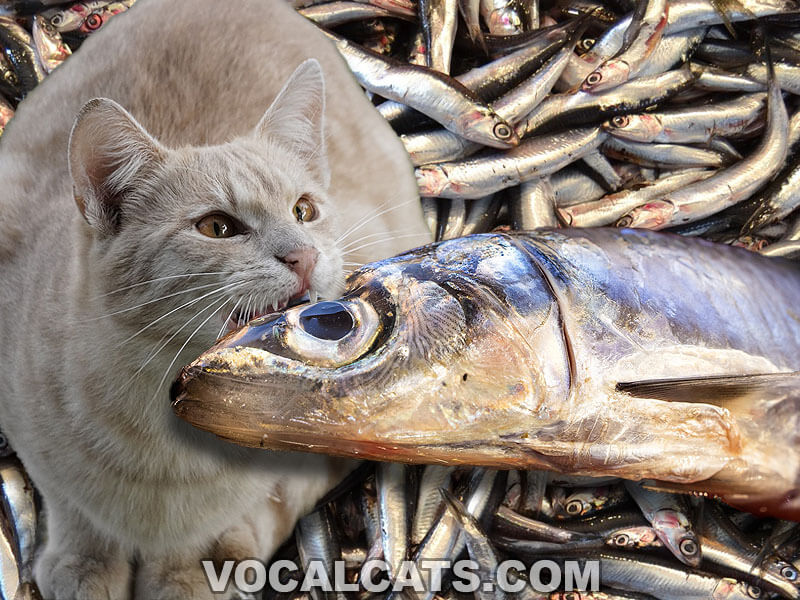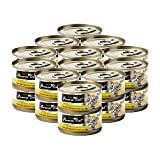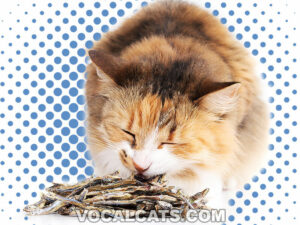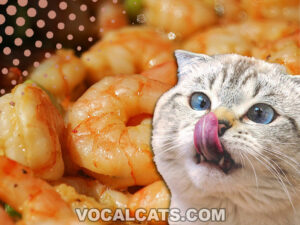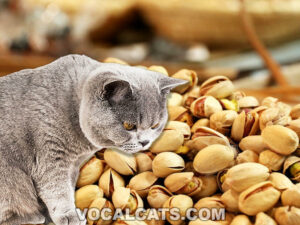Can Cats Eat Anchovies? Yes, Cats can eat Anchovies in moderation. Anchovies are a good source of protein, omega-3 fatty acids, and essential nutrients for your cat. However, you’ll want to make sure they’re unsalted and served in small amounts, as high salt content can be harmful to cats. Also, avoid feeding Anchovies as a primary food source, as cats require a balanced diet.
You’re in the kitchen, preparing a mouthwatering soup that calls for Anchovies. You grabbed a few Anchovies from the bag on the counter and head to the stove. In that brief instant, your feline friend leaps onto the counter and swipes an Anchovy. This unexpected event leaves you wondering, “Can I give my cat Anchovies?”
In this article, we will explore whether this small, oily fish reminiscent of mackerel is a safe and nutritious addition to your cat’s diet and what types of Anchovies are good for your feline friend. Let’s begin!
Contents
- Can Cats have Anchovies?
- What are Anchovies?
- Are Anchovies good for Cats?
- Are Anchovies safe for Cats?
- Are Anchovies too salty for Cats?
- Do Cats Eat Anchovies?
- Do Cats like Anchovies?
- Can kittens eat Anchovies?
- Anchovies for Cats
- How much Anchovies Can a Cat Eat?
- How to properly feed your Cats Anchovies?
- How to cook Anchovies for cats?
- So, Can Cats Eat Anchovies?
- Related Questions
Can Cats have Anchovies?
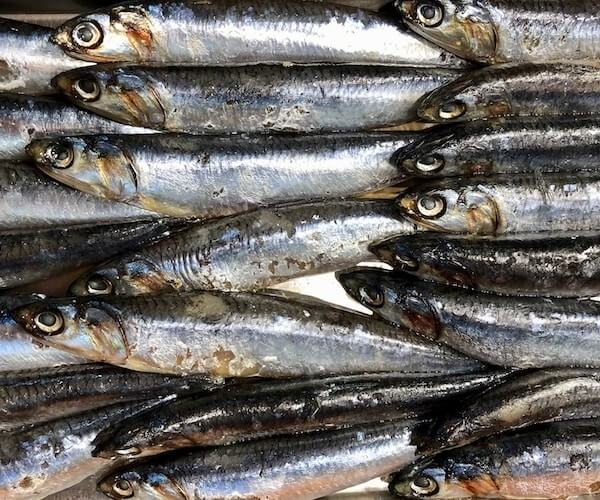
Yes, cats can have Anchovies in moderation and as an occasional treat. This fish is both delicious and full of valuable nutrients such as protein and omega-3 fatty acids.
In addition, Anchovies are low in carbs and have a low-fat content. It’s no wonder why they are a healthy treat for your furry friends.
However, it’s crucial to bear in mind that moderation is key. In order to keep your feline friends happy and healthy, you’ll want to limit the amount of unsalted Anchovies you give to your cats. Anchovies should not replace your cat’s main diet. They should only be consumed as a treat.
RECOMMENDED: Can Cats Eat Sardines? (Canned, Raw, Dried, Oil)
What are Anchovies?
Anchovies are small, saltwater fish belonging to the Engraulidae family. They can be found in the Mediterranean Sea, the Black Sea, and the Atlantic and Pacific Oceans.
These tiny fish typically measure around 2 to 6 inches in length and are known for their strong, salty flavor.
Anchovies are commonly used as a seasoning or ingredient in a variety of dishes, including pizzas, salads, pasta, and sauces. They are often preserved in salt, oil, or other forms, making them available in cans or in jars.
In addition to their culinary uses, Anchovies are rich in nutrients, including omega-3 fatty acids, protein, and several essential vitamins and minerals. This makes them a valuable addition to your cat’s balanced diet when consumed in moderation.
CHECK OUT: Can Cats Eat Shrimp?
Are Anchovies good for Cats?
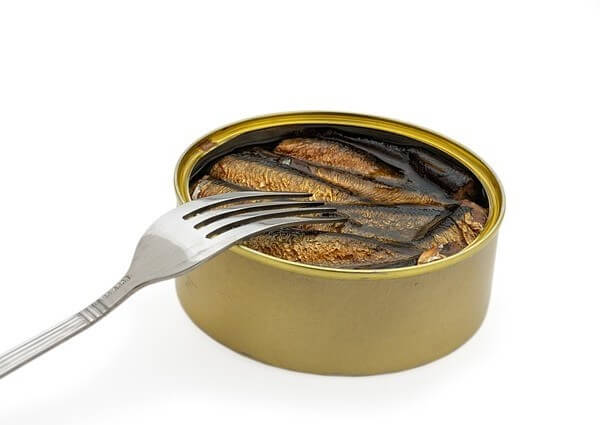
Yes, Anchovies are good for your cat when consumed in moderation. When offering Anchovies to your cat, you’ll want to consider these important factors: food preferences, sensitivities, and food history.
Whether your cat loves Anchovies depends on how you prepare them. Now, one great way to understand how your cat can benefit from Anchovies is to know what they stand to gain.
Anchovies provide protein, omega-3 fatty acids, and essential nutrients that support a cat’s overall health. Below we will discuss each one of these nutrients in more details.
Here are eight (8) reasons why Anchovies can be good for your cat:
1. Anchovies are packed full of vitamins
Did you know that this small, saltwater fish is rich in several types of vitamins?
Anchovies contain several vitamins that are beneficial for cats, including the following:
Vitamin A
Vitamin A is very important for a cat’s eyesight. It helps them see better at night and keep their eyes healthy. It keeps the clear part of their eye and the lining inside their eyelids in good shape.
DON’T MISS: Why Does My Cat Look Out The Window At Night?
This essential vitamin also helps make tears, which protect and moisturize their eyes. To keep your cat’s eyes healthy, give them a balanced diet with the right amount of vitamin A, but don’t give them too much.
Vitamin B-3 (Niacin) is necessary for energy production and the proper functioning of the nervous system. Niacin also helps maintain healthy skin and coat in cats in cats.
Vitamin B-12 (Cobalamin)
Vitamin B-12 or Cobalamin is vital for the formation of red blood cells, nervous system function, and the synthesis of DNA in cats. It can also boost your cat’s energy because this essential nutrient helps to convert food to energy.
Since our cat’s body can’t produce vitamin B-12 naturally, the only way to get this water-soluble vitamin is through their diet. When cats absorbs vitamin B-12, it stays in their body for about 13 days.
All cats need this essential nutrient. A deficiency in vitamin B-12 in cats can lead to:
- Weakness and lethargy: Cats with a vitamin B12 deficiency may appear weak, tired, or less active than usual.
- Loss of appetite: Your fuzzy friend may start to lose interest in food. This can lead to weight loss.
- Gastrointestinal issues: A deficiency in vitamin B12 can cause vomiting, diarrhea, and other digestive problems in cats.
- Anemia: As mentioned above, vitamin B-12 plays a crucial role in the formation of red blood cells. Lack of vitamin B-12 can lead to anemia. Some of the symptoms include pale gums, weakness, and an increased heart rate.
- Neurological symptoms: In severe cases of vitamin B-12 deficiency, your feline friends may experience neurological symptoms such as uncoordinated movements, tremors, or even seizures.
If you suspect your cat is suffering from a vitamin B-12 deficiency, we highly recommend that you contact your veterinarian right away for proper diagnosis and treatment.
Your vet may recommend vitamin B-12 injections or supplements to restore the appropriate levels of this vital nutrient in your cat’s body.
Additionally, providing a balanced diet (high-quality, specially-formulated cat food) that contains adequate amounts of vitamin B-12 is essential for maintaining your cat’s overall health.
Question of the day: Lobsters are also packed full of B vitamins. But is it safe for feline consumption? Check out Can Cats Eat Lobster? Read This Before Offering a Bite to find out!
Vitamin D is essential for cats to regulate and absorb calcium and phosphorus, which are crucial for maintaining strong bones and teeth, as well as supporting muscle and nerve function.
This vitamin also has anti-inflammatory properties. Research has shown that vitamin D can help regulate the immune system and suppress inflammatory responses.
So how does vitamin D help control inflammation? It It does so changing the way certain parts of the body, called cytokines, communicate. These cytokines are like tiny messengers that tell your body to have more or less inflammation.
By reducing inflammation, vitamin D can potentially help alleviate symptoms associated with inflammatory conditions, such as rheumatoid arthritis, multiple sclerosis, and inflammatory bowel disease.
However, it’s important to note that further research is necessary to fully understand the extent of vitamin D’s anti-inflammatory effects.
Vitamin E acts as an antioxidant, protecting cells from damage caused by free radicals. It also supports immune function and contributes to healthy skin and coat in cats.
2. Anchovies are a source of Omega-3 fatty acids for Cats
Omega-3 fatty acids, which are present in Anchovies, can provide several health benefits for cats. Some of these health benefits include:
Skin and coat health
Omega-3 fatty acids help maintain a shiny and healthy coat by promoting the production of natural oils in the skin. They also alleviate dry, flaky skin and reduce inflammation, which can be beneficial for cats suffering from skin allergies or dermatitis.
Joint health
Omega-3s have anti-inflammatory properties that can help reduce joint inflammation and pain in cats, particularly those with arthritis or other joint issues. Eating food that contains Omega-3 fatty acids can improve your cat’s mobility and overall quality of life.
Heart health
Omega-3 fatty acids support cardiovascular health in cats by reducing inflammation, regulating blood pressure, and preventing the formation of blood clots. They can also help lower triglyceride levels, which contribute to heart disease when elevated.
Cognitive function
Omega-3s play a role in brain development and function, and they may help maintain cognitive health in aging cats. These fatty acids are essential for maintaining cell membrane structure and function, which is crucial for optimal brain function.
Immune system support
Omega-3 fatty acids can help regulate the immune system by reducing inflammation and supporting overall immune function, which may help cats fight off infections and diseases.
While Anchovies can be a good source of omega-3 fatty acids for cats, it’s important to remember that they should be fed in moderation and as part of a balanced diet.
Also, when feeding your cat Anchovies, make sure they are unsalted and plain.
3. Selenium in Anchovies supports healthy immune system in cats
Selenium is a powerful antioxidant that protects the cell from damage. That’s because it helps neutralize harmful free radicals, which can cause cellular damage and contribute to various health issues. By protecting cells from oxidative stress, selenium aids in maintaining overall health and well-being in cats.
Additionally, Selenium plays a role in strengthening the immune system by helping cats fight off infections and diseases more effectively.
Next, Selenium is essential for the proper functioning of the thyroid gland. The thyroid gland is what regulates metabolism and other critical body processes in cats.
Lastly, receiving the right amount of selenium is necessary for maintaining reproductive health in both male and female cats.
So go ahead and give your furry friend a piece or two of the Anchovies! It’s important to remember that while Anchovies can be a good source of selenium for cats, they should be fed in moderation and as part of a balanced diet.
Excessive selenium intake can be harmful and toxic. Therefore, it’s crucial to ensure your cat receives the appropriate amount of selenium from their diet.
Did you know…? Crab meat is also a great source of selenium. But is crab meat safe for cats to eat? Check out Can Cats Eat Crab? to find out!
4. Calcium in Anchovies supports strong teeth and bones in cats
Calcium helps keep your cat’s teeth and claws healthy and strong. It also plays a role in bone health and strength. Anchovies are a good source of calcium, which also help promote nerve function and blood clotting.
5. Iron is needed for proper growth & development in cats
Anchovies are a rich source of iron. And all cats need iron for proper growth and development. So what is iron?
Iron is a mineral that your cats’ body need to carry oxygen from their lungs to the rest of the body, giving them the energy they need to live and grow.
Iron can also help prevent anemia in cats.
6. Anchovies are a good source of protein for cats
Anchovies are full of nutrients, and protein is one of them. Protein is a vital nutrient for cats, and Anchovies provide a good source of high-quality protein.
Here’s how protein in Anchovies can benefit your cats:
- Muscle growth: Protein is made up of building blocks called amino acids. Cats need these amino acids to build and maintain their muscles, keeping them strong and healthy.
- Growth & repair of tissues: Protein is essential for the growth and repair of various body tissues, such as skin, fur, and internal organs. It also helps cats recover from injuries.
- Energy source: When needed, cats can break down protein and use it as a source of energy, helping them stay active and alert.
- Production of enzymes, hormones, and antibodies: Protein is involved in the production of essential enzymes and hormones that regulate various body processes. Additionally, it plays a role in creating antibodies, which help cats fight off infections and diseases.
Are Anchovies safe for Cats?
There is no doubt that Anchovies are safe for cats. However, here’s how they can sometimes be unsafe for feline consumption.
Anchovies are prone to parasites such as the following:
- Anisakis: These roundworm parasites can infect marine fish, including Anchovies. Cats may develop gastrointestinal issues if they consume raw or undercooked fish containing live Anisakis larvae.
- Diphyllobothrium: Known as fish tapeworm, this parasite can be present in various fish species, including Anchovies. If cats consume raw or undercooked fish containing the tapeworm’s larvae, they could become infected.
- Cestodes: These flatworms can infect fish, and although the risk of infection is low, cats may become infected if they consume raw or undercooked fish containing the parasites.
One of the best ways to get rid of these parasites is by freezing the Anchovies. You’ll want to freeze the fish at 0°F (-17.8°C) for at least 7 days.
Another way is to cook the Anchovies before offering them to your four-legged friends. You’ll want to pan-fried them at 145°F (63°C) for about 3 minutes. This will help eliminate the parasites so it’s safe for feline consumption. Remember to never feed your cats raw Anchovies.
Some fishes are known to have high mercury level. Fortunately, Anchovies are low in mercury. This is why they are one of the best seafood option for cats.
DON’T MISS: Can Cats Eat Imitation Crab? Purr-suing the Truth About Surimi!
Are Anchovies too salty for Cats?
While Anchovies offer many health benefits to cats, their salt content can be a cause for concern.
According to the U.S. Department of Agriculture, 3 ounce (85 grams) of Anchovies contain 88.4 milligrams of sodium. Although this may seem harmless to us, it is a lot of salt for our furry friends.
According to the Association of American Feed Control Officials (AAFCO), our pets should have a minimum of 0.2% salt in their diet. This means that an adult cat should only have 200 mg of salt per kg of body weight per day.
Keep in mind that our cat’s main food already contain the appropriate quantity of sodium. So any amount of sodium over their daily recommended intake can lead to salt toxicity.
As we can see, our furry friends are more sensitive to salt than we are. Therefore, excessive salt intake can lead to dehydration, hypertension, and renal damage.
Do Cats Eat Anchovies?
Yes, some cats do eat Anchovies because they enjoy the aroma, taste, and texture of this small fish.
Cats can safely eat Anchovies in moderation because they are high in protein and omega-3 fatty acids. Both of these are important for feline health.
Giving your cat one Anchovy occasionally is fine, but remember that excess fish in their diet may cause an imbalance in nutrients. Also, before feeding your cat Anchovies, you’ll want to remove the bones to avoid any choking hazard.
Do Cats like Anchovies?
The answer is a resounding yes, cats do like Anchovies. Some cats enjoy the taste of Anchovies because this fish has a strong smell and is very flavorful. While other cats may not enjoy it as much and are not interested.
It’s important to remember that if you do decide to feed your cat Anchovies, do so in moderation and as part of a balanced diet. Make sure the fish is properly cooked to reduce the risk of parasites and avoid feeding your cat Anchovies that have been preserved in salt, as the high sodium content can be harmful to cats.
Can kittens eat Anchovies?
Kittens can eat Anchovies too, but it’s important to feed them Anchovies in moderation and as part of a balanced diet.
Make sure the Anchovies are properly cooked to get rid of any potential parasites. The Anchovies should be fresh and deboned. You’ll also want to avoid giving your kitten salt-cured Anchovies, as the high sodium content can cause salt toxicity.
It’s important to keep in mind that our precious kittens have specific nutritional needs that must be met to support their growth and development.
Thus, it’s crucial to provide them with high-quality kitten food as their primary diet. This is because kitten food is specifically formulated to meet their unique dietary requirements. Additionally, our kittens are still growing so their digestive system may not be strong enough to handle Anchovies.
You can offer cooked Anchovies as an occasional treat, but it should not be the primary source of nutrition for them.
If you’re unsure about your kitten’s diet or want advice on feeding them Anchovies, we highly recommend that you consult your veterinarian.
Anchovies for Cats
As we can see, Anchovies contain essential nutrients, omega-3 fatty acids, and protein. All of which are great for your cat’s health. But it’s important to keep in mind that moderation is key. A small piece of fresh, plain Anchovy is enough for your feline friends once or twice a week.
If you cook Anchovies for your cat, make sure to cook them thoroughly to eliminate parasites and bacteria.
With this in mind, let’s delve deeper into the different types of Anchovies such as dried, canned, raw, and Anchovies in oil and find out if they are safe for feline consumption.
Can Cats Eat Dried Anchovies?
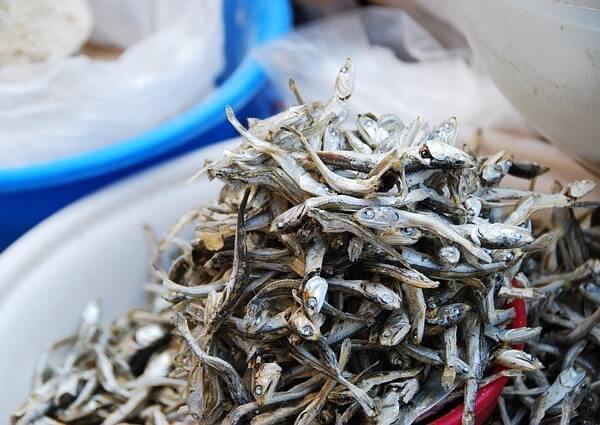
Yes, cats can eat dried Anchovies, but it’s important to exercise caution. Dried Anchovies are often high in salt content due to the preservation process. If your cat consume too much salt from the dried Anchovies, they may experience dehydration, high blood pressure, and even kidney issues.
If you choose to feed your cat dried Anchovies, make sure they are low in sodium or thoroughly rinsed in water to remove any excess salt. Additionally, offer dried Anchovies only as an occasional treat and not as a staple in your cat’s diet.
Can Cats Eat Canned Anchovies?
Ideally, cats should not eat canned Anchovies. Many canned Anchovies are preserved in oil and salt, which can be harmful to cats if consumed in large quantities.
High sodium content can lead to dehydration, high blood pressure, salt toxicity, and kidney issues. Consuming too much oil can contribute to weight gain and obesity.
If you do decide to offer your cat canned Anchovies as a treat, choose a low-sodium option, drain the oil, and rinse the fish in cool water to remove excess seasoning or salt.
If the Anchovies are canned in plain water, then they are safe for feline consumption.
With that said, make sure to offer them Anchovies as an occasional rare treat.
If your fuzzy friends love canned Anchovies, give them the Fussie Cat Premium Tuna with Anchovies instead. It is a healthier option and made specifically for our precious cats.
Can Cats Eat Anchovies in oil?
Yes, cats can eat Anchovies in certain types of oil. Although oil is not harmful to cats, not all oil is safe or healthy for cats. If the Anchovies are canned in soybean oil, canola oil, and corn oil, do not feed the Anchovies to your cat.
Moreover, the added calories and fat content in oil can contribute to weight gain and obesity if fed too frequently.
Be aware that some Anchovies in oil might be seasoned or contain added salt, which can be harmful to cats in large amounts.
When feeding your cat Anchovies in oil, drain the oil, and rinse the fish in cool water to remove excess seasoning or salt.
You’ll want to offer Anchovies in oil to your cat as an occasional treat rather than a regular part of your cat’s diet to avoid any negative health effects.
If your cat love Anchovy oil or sardine oil, stay away from Anchovies in oil and offer them the Iceland Pure Unscented Sardine Anchovy Oil instead.
Anchovy oil is beneficial for cats for several reasons:
Rich in Omega-3 fatty acids
Anchovy oil is an excellent source of Omega-3 fatty acids, specifically EPA (eicosapentaenoic acid) and DHA (docosahexaenoic acid), which contribute to your cat’s overall health. These fatty acids will give your cat a healthy skin and coat. As a result, this helps reduce shedding and alleviate skin irritations.
Promotes heart and joint health
Omega-3 fatty acids in Anchovy oil can help reduce inflammation, promote heart health and support joint function in cats. This is especially beneficial for senior cats or those with joint issues.
Supports immune system function
Omega-3s help maintain a strong immune system in cats.
Purity and quality
The Iceland Pure Unscented Pharmaceutical Grade Anchovy Oil is sourced from the clean, cold waters of the North Atlantic, ensuring a high-quality product free from toxins and heavy metals. The oil is also unscented, making it more palatable for cats.
Incorporating Anchovy oil into your cat’s diet can provide numerous health benefits, contributing to a happier and healthier feline companion.
Can Cats Eat Anchovies in olive oil?
Yes, your cat can eat Anchovies in olive oil, but it is best to feed them in moderation.
Although olive oil isn’t harmful to cats and can even provide some health benefits, it’s crucial to remember that it is high in calories and fat.
Feeding your cat Anchovies in olive oil too frequently could lead to weight gain and obesity. Additionally, some Anchovies in olive oil might be seasoned or contain added salt. This can be harmful to your furry friends in large amounts.
When feeding your cat Anchovies in olive oil, we recommend draining the oil and rinsing the fish to remove the olive oil and any salt or seasoning on it.
As long as you offer the Anchovies as an occasional treat rather than a regular part of your cat’s diet, it should be fine.
Can cats eat Anchovies in sunflower oil?
Yes, cats can eat Anchovies in sunflower oil. However, it’s important to feed them in moderation. Like olive oil, sunflower oil is also high in calories and fat. This can lead to weight gain and obesity in cats if fed too frequently.
Additionally, some Anchovies in sunflower oil may be seasoned or contain added salt, which can be harmful to cats in large amounts.
Any time the Anchovies are canned in sunflower oil, you’ll want to drain the oil and rinse the fish. This will help remove any added salt or seasoning.
Remember to offer your cat Anchovies as a treat. Treats should only make up 10% or less of your cats’ daily calorie intake.
Can Cats Eat Raw Anchovies?
No, cats should not eat raw Anchovies. Feeding raw Anchovies to cats is not advisable because raw Anchovies may contain a harmful parasite and bacteria that can cause digestive problems.
We’ve already listed the parasites often found in Anchovies. So here, we will list the bacteria that can be found in raw Anchovies that are harmful to cats:
- Salmonella: Salmonella is a common cause of foodborne illness. It can lead to gastrointestinal distress, fever, and even severe complications in cats. Cats can develop salmonellosis, which may result in vomiting, diarrhea, dehydration, and loss of appetite.
- Listeria monocytogenes: Listeria can cause listeriosis in cats, leading to symptoms such as fever, diarrhea, and vomiting. In severe cases, it can result in encephalitis, septicemia, and even death.
- Campylobacter: Campylobacter is another bacterium that can cause gastrointestinal illness in cats. It can lead to diarrhea, vomiting, and abdominal pain.
- Clostridium perfringens: This bacterium can cause enteritis in cats, resulting in diarrhea and abdominal discomfort.
Additionally, raw fishes have thiaminase enzyme, which breaks down thiamine. That breakdown can cause thiamine deficiency with symptoms like seizures.
Can cats eat Anchovies with bones?
Yes, cats can eat Anchovies with bones, but it is not recommended. The bones in Anchovies, especially if cooked, can become brittle and splinter. This can be a choking hazard for cats. Additionally, it can cause injury to the mouth, throat, or esophagus.
Moreover, if your furry friends do manage to swallow the Anchovy bones, the ingested bones can cause obstructions, tears, or even perforations in the gastrointestinal tract, which can be life-threatening.
If you want to feed your cat Anchovies, it’s best to remove the bones first before offering it to them. Always opt for plain, cooked Anchovies without added salt, seasonings, or preservatives. And remember to serve them in moderation as an occasional treat.
How much Anchovies Can a Cat Eat?
You can offer your cat one or two small Anchovies per week, depending on the size of the fish and your cat’s weight.
Keep in mind that every cat is different. Some may have specific dietary needs or sensitivities. If you’re still not sure how much Anchovies is safe to give to your cat, we highly recommend that you consult with your veterinarian for personalized advice.
Always remember to remove the bones before feeding Anchovies to your cat. The Anchovies should be served plain, cooked, and without any added salt, seasonings, or preservatives.
How to properly feed your Cats Anchovies?
If you decide to feed your cat Anchovies, you should make it a rare occasional treat.
These tips will be helpful:
First, you should select fresh, high-quality Anchovies. Fresh Anchovies may be wild-caught or commercially available. Ensure that your choice of Anchovies is free of preservatives and salt.
Next, cook the fresh Anchovies thoroughly to get rid of the parasites and bacteria. You can cook them by baking or steaming.
Then feed your cat the Anchovies. Before you feed your cat, you should cut the fish into smaller bite-sized pieces to prevent choking and digestive problems. Lastly, feed your cat in moderation.
How to cook Anchovies for cats?
Cooking Anchovies for your cat is quite simple. Here’s an easy step-by-step guide on how to cook Anchovies for your cat:
- Choose fresh or frozen Anchovies: Opt for fresh or frozen Anchovies without any added salt, seasoning, or preservatives. Thaw the frozen Anchovies in the refrigerator for at least 2 hours before cooking.
- Clean the Anchovies: Remove the head, tail, and insides of the Anchovies. Rinse the fish thoroughly under cold water to remove any scales or debris.
- Remove the bones (optional): While cats can typically handle small fish bones, you may choose to remove the bones for added safety. You can do this by gently running your fingers along the fish’s spine to separate the flesh from the bones.
- Cook the Anchovies: Steam or bake the Anchovies without any added salt, oil, or seasoning. Here are three methods you can follow:
- Steaming: Place the Anchovies in a steamer basket over boiling water, cover, and steam for 3-4 minutes or until cooked through.
- Baking: Preheat your oven to 350°F (180°C). Place the Anchovies on a lined baking sheet and bake for 8-10 minutes or until cooked through.
- Cool the Anchovies: Allow the cooked Anchovies to cool down to room temperature before feeding them to your cat.
- Serve as a treat: Offer the cooked Anchovies as an occasional treat, not as a main meal.
Always supervise your cat when introducing new foods and consult your veterinarian if you have any concerns about your cat’s diet.
So, Can Cats Eat Anchovies?
Anchovies are a good treat for cats, and they are highly nutritious. If you have concerns about feeding your cat Anchovies, you should talk to a veterinarian. Also, know the feeding patterns of your cat and feed them accordingly.
Related Questions
Anchovies are a nutritious addition to your cat or dog’s meal when fed in moderation. However, avoid feeding them Anchovies that is covered in oil, salt, and preservatives.
Plain sardines and Anchovies are both great for cats because they are nutritious and healthy. You should consider feeding your cats these fishes as an occasional treat.
Adult cats and kittens can eat Anchovies. But if your cat has a specific health condition, digestive sensitivities, or digestive issues, they should not eat Anchovies.
DISCLAIMER: THIS WEBSITE DOES NOT PROVIDE MEDICAL ADVICE
The information, including but not limited to, text, graphics, images and other material contained on this website are for informational purposes only. No material on this site is intended to be a substitute for professional veterinary advice, diagnosis, or treatment. Always seek the advice of your veterinarian or other qualified health care provider with any questions you may have regarding dietary needs.
Resources:
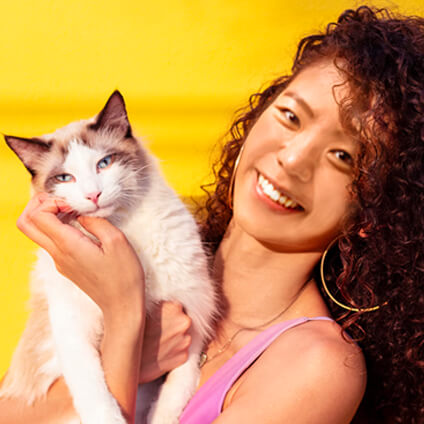
With over five years of specialized experience as an animal writer, my expertise lies in cat nutrition, health, behavior, grooming, and training. I am dedicated to delivering helpful and informative content that caters to the well-being of our feline friends. My primary goal is to empower pet owners with knowledge and ensure our feline companions thrive in health and happiness. In my free time, I love volunteering at local cat rescue centers.
